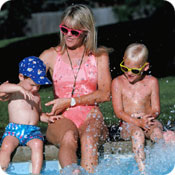 Summer should be carefree. With summer come trips to the beach and the neighborhood pool, as well as a whole lot of frolicking outdoors. School's out, the weather is great for barbecuing, and life just operates at a slightly more leisurely pace. Unfortunately, summer isn't all sleeping in and cookouts. You've got to be on your toes to keep the kiddos safe from sunburns, bug bites and other warm-weather health hazards. But with just a little know-how, you and the kids can enjoy all that summer has to offer!
Summer should be carefree. With summer come trips to the beach and the neighborhood pool, as well as a whole lot of frolicking outdoors. School's out, the weather is great for barbecuing, and life just operates at a slightly more leisurely pace. Unfortunately, summer isn't all sleeping in and cookouts. You've got to be on your toes to keep the kiddos safe from sunburns, bug bites and other warm-weather health hazards. But with just a little know-how, you and the kids can enjoy all that summer has to offer!The Hazard: The Sun and Heat More time outside means more sun exposure, and that lovely, warm sunshine can be the cause of stinging sunburns. But sunburns are preventable with a little vigilance. Avoiding the sun during the hours of 10 a.m. and 4 p.m. is the No. 1 way to prevent too much exposure. But when it's not possible to stay indoors during those times, slather on the sunscreen frequently, consistently and thoroughly. The American Academy of Dermatology recommends applying sunscreen daily, even if you aren't going to be in the sun, as well as on cloudy days, as 80 percent of the sun's UV rays can pass through the clouds. Apply sunscreen 15 to 30 minutes before heading outside and don't be afraid to cover the skin liberally--use enough to fill a shot glass, the AAD says. Dr. Dennis Kuo, assistant professor of pediatrics at Arkansas Children's Hospital, says the biggest mistake he sees parents make is not using sunscreen on their children regularly. He stresses covering young kids with sunscreen in addition to clothing and hats. "I do think you have to have a happy medium because no 8-year-old's going to want to go play baseball in a wide-brim hat," he says. "But you have to be respectful of when the sun is strongest, and you've got to get the sunscreen on them." When choosing a sunscreen, look for one that's PABA-free and at least SPF 15, says Kuo. In addition, avoid using combination products such as bug-repellent and sunscreen in one because while you should reapply sunscreen every one to two hours, it's not necessary to apply insect repellent that frequently, Kuo says. For infants, be sure to cover the skin as much as possible and keep them out of the sun's rays. While there are recommendations against using sunscreen on infants of less than 6 months, Kuo says it's more of a matter that they haven't been tested in kids under 6 months of age, and parents must weigh the risk of sunburn against the risk of a reaction to the sunscreen. "Cover what you can and put sunscreen on the rest," he says. When a sunburn does occur, Kuo says to use a hydrocortisone cream to take away some of the sting. A children's Tylenol or ibuprofen can also be used to keep kids comfortable. For second-degree sunburns, which are marked by blisters, kids should see a doctor to prevent possible infections. In addition to sunburn, the heat of the sun can be a danger. Running around on hot summer days can be a blast, but kids (and parents) need to make sure they stay cool and hydrated. To avoid overheating, Kuo says to be respectful of the hottest times of the day. Wear light-colored clothing to reflect the sun's rays and most importantly, provide unlimited access to water. The Hazard: The Pool Some of my fondest memories of summer are of swimming with my brothers. But this oh-so-fun summer pastime can also be dangerous. Drowning is the second most common cause of death from injuries among kids under the age of 14, according to KidsHealth.org, so precautions must be taken around pools, lakes, and at the beach. The American Academy of Pediatrics' The Injury Prevention Program says children should never be left alone in or near a pool, even for a moment. It recommends practicing "touch supervision" with children under 5 years old--meaning an adult should be within arm's length of the child at all times. Just because a child knows how to swim doesn't mean that he or she is safe in the water, so pay attention at all times. The AAP says that most children who drown in pools wander out of the house and fall into the pool, so put up a fence at least 4 feet high around the entire pool to completely separate the pool from any play areas. "Young kids should never, ever, ever be unsupervised at a pool," Kuo says. The Hazard: Bugs Creepy-crawlies are prevalent in the summer, but the ones that bite have the most potential to make your kids squirm. To avoid those pesky bites, look for an insect repellent with permethrin, which should only be applied to clothing, or DEET. DEET repellents come in varying concentrations, but the AAD recommends a 10 percent concentration or less when applying it to children. (Avoid using DEET on babies younger than 2 months old.) The varying concentrations of DEET don't mean that it's more effective, just that it lasts longer, says Kuo. DEET of about 10 percent will last a couple of hours, whereas DEET of 30 percent will generally last about 5 hours. "If you're going to apply to skin, apply to exposed skin only," he says. When those inevitable bug bites do occur, keep the area clean and keep kids from scratching the bite if possible. Kuo says you can use a topical or oral Benadryl to curb itching. "If they're scratching it so furiously that they're starting to create a break in the skin, then you can put Neosporin on it to prevent it getting infected but otherwise you just have to keep it clean and dry." Ticks can also be a concern if you're frequently in wooded areas or tall grass. Use a bug repellent, wear long sleeves and pants, and be sure to do tick checks at the end of the day. If a tick has attached itself, use tweezers to grasp it by the head and pull it straight out. Kuo says it takes time for a tick to transfer a disease, so parents shouldn't worry if a tick is removed quickly. "If you pull ticks off, we generally do not treat for exposure to ticks because the chances that a child got something from any individual tick bite is actually pretty low," he says. When should you be concerned about bites? Look for pain. "If it's just itching, I would leave it alone," Kuo says. "If it hurts, if it drains, you should call. If it gets big, you should call." The Hazard: Poison Ivy We all know the rhyme: Leaves of three, let it be. But what if your kiddos didn't let it be or unknowingly rolled around in poison ivy? Immediately wash their hands, cut their nails, wash their clothes and then wash them--and do the same to yourself, Kuo says. Poison ivy doesn't spread once its oils are gone, but getting rid of the oils quickly is important. If there is a poison ivy outbreak despite the head-to-toe washing, using an oral Benadryl will cut down on itching, and calamine lotions can have a cooling effect on the skin. If those options aren't enough or you have an outbreak on a hard-to-treat area like the face, you can see a doctor for a stronger steroid cream. The more you avoid summer's hazards, the more fun you can have. So crack open a bottle of sunscreen, pour some tall glasses of lemonade and enjoy! |
Summer Safety Tips
Have Fun and Keep Kids Out of Danger
Page 1 of 1






Member Comments